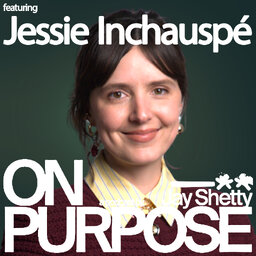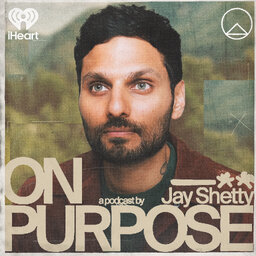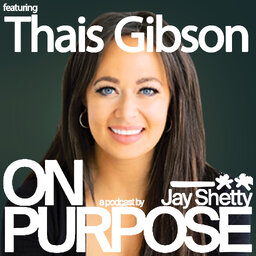Nicole LePera: How to Break the Cycle of Trauma Bonds & Stop Toxic Relationship Habits
What are your emotional needs?
How do you communicate them clearly?
Today, Jay welcomes back Dr. Nicole LePera, a holistic psychologist, best-selling author, and founder of the SelfHealers Circle, a global community for self-healing. She is the author of the New York Times bestseller "How to Do the Work," and her latest book, "How to Be the Love You Seek," guides readers on breaking cycles, finding peace, and healing relationships. Dr. LePera is known for her approachable, transformative approach to mental wellness, empowering individuals to heal themselves and live authentically.
Nicole talks about how our earliest experiences shape our adult relationships. She explains the concept of trauma bonds—dysfunctional patterns that often stem from childhood but persist into adulthood, affecting how we connect with others. These bonds can feel familiar and even comforting, but they often prevent us from forming healthy, fulfilling relationships.
Jay and Nicole explore how awareness is the first step toward breaking these patterns. They emphasize the importance of understanding our subconscious beliefs and the roles we play in relationships, often unknowingly repeating cycles of pain and misunderstanding. She talks about the importance of staying present, learning to regulate our emotions, and building healthier habits that align with our true selves, and offers practical advice on how to navigate the complexities of love, whether it's setting boundaries with toxic family members or letting go of unrealistic expectations in romantic relationships.
In this interview, you'll learn:
How to recognize trauma bonds
How to break the cycle of reactivity
How to set healthy boundaries
How to cultivate self-awareness
How to develop emotional resilience
How to foster a growth mindset in relationships
Remember, every moment is an opportunity to choose differently, to show up for ourselves with kindness, and to build the relationships we truly deserve.
With Love and Gratitude,
Jay Shetty
What We Discuss:
00:00 Intro
03:44 You Create Change
06:58 Toxic Family Members
11:21 Change is Voluntary
14:33 Deep Rooted Emotions
18:35 Why We Struggle in Relationships
22:58 The Unmet Needs
27:27 We Project What We Think to Others
34:29 Familiarity with Chaos
38:18 Is It Genuine Love?
41:55 Panic Attack
48:54 Chronic Illness
53:54 Countering Beliefs
57:17 Physiological Shifts
01:01:11 What is a Trauma Bond?
01:04:25 Attraction Based on Familiarity
01:06:24 Inner Child Work
01:09:41 The Habit of Showing Up Authentically
Episode Resources:
Nicole LePera | Website
Nicole LePera | Instagram
Nicole LePera | Facebook
Nicole LePera | TikTok
Nicole LePera | YouTube
Nicole LePera | LinkedIn
How to Do the Work: Recognize Your Patterns, Heal from Your Past, and Create Your Self
How to Be the Love You Seek: Break Cycles, Find Peace, and Heal Your Relationships
Special thank you to Kajabi. Visit: https://kajabi.com/JayShetty
In 1 playlist(s)
On Purpose with Jay Shetty
My name is Jay Shetty, and my purpose is to make wisdom go viral. I’m fortunate to have fascinating …Social links
Follow podcast
Recent clips

Jessie Inchauspé: 90% of Pregnant People Are Missing THIS Nutrient (Follow THIS Simple Diet To Reduce Glucose Spikes & Protect Your Baby’s Brain & Metabolism)
1:12:12

Stop Trying to “Win” An Argument With Your Partner! (THIS Shift Will Turn Conflict into Communication)
38:35

Relationship Expert Thais Gibson: Do You Keep Attracting The Same Emotionally Unavailable Partner? (Use THIS Attachment Reset To Break The Cycle And Choose Better Partners)
1:44:33
 On Purpose with Jay Shetty
On Purpose with Jay Shetty